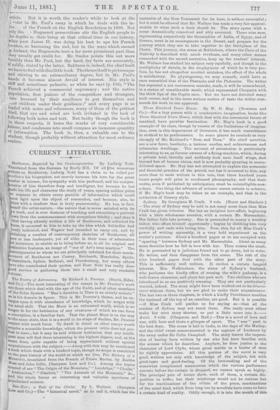Sydney. By Georgiana M. Craik. 8 vols. (Hurst and Blackott.)
—The story of Sydney maybe told in not many more lines than Miss Craik has given volumes. She has an incipient love-affair, beginning with a little wholesome aversion, with a certain Mr. Marmaduke. Her father falls into poverty. She is persuaded to marry a wealthy suitor, who offers himself opportunely ; begins by disliking him very cordially, and ends with loving him. Now, this, for all Miss Craik's power of writing agreeably, is a very bold experiment on the reader's patience. About a hundred pages or so are occupied with " sparring " between Sydney and Mr. Marmaduke. About as many more describe how he fell in lovo with her. Then comes the crash. He is persuaded by a judicious friend not to go down, but to write. He writes, and then disappears from the scene. 'rho rest of the nine hundred pages deal with the other part of the story. This is sufficiently well written. It excites a certain languid interest. Mrs. Walkinahaw, the sister of Sydney's husband, who performs the kindly office of rousing the wife's jealousy, is a well-drawn character, and plays her part well. Two children who are introduced to us are positively amusing. They are not particularly wanted, indeed. The story might have been worked out to its denoue- ment without thorn, but wo are glad to make their acquaintance. The last two or three chapters, in which a kindly Providence tumbles the husband off the top of an omnibus, are good. But it is possible —if Miss Craik will pardon us for saying so—that all the readers of Sydney may not reach them. She really must either make her next story shorter, or put a little more into it.— Amat. 3 vols. (Chapman and Hall.)—This is a novel of love and war, with here and there a glimpse of sport. The " war " part is the best done. The scene is laid in India, in the days of the Mutiny, and the chief event commemorated is the capture of Lncknow by the army under Sir Colin Campbell. The story loaves the impres- sion of having been written by one who has been familiar with
the scenes which he describes. Anyhow, he does justice to the character of Lord Clyde, whose great merits as a loader of men ho rightly appreciates. All this portion of the novel is very good, written not only with knowledge of the subject, but with good.tasto and good-feeling. Of the love-making and of the somewhat complicatod mancouvres which the various performers execute before the curtain is dropped, we cannot speak so highly.
The principal pair of lovers show, each of them, a certain dis- position to trifle; but their misdoings would not be serious but
for the machinations of the villain of the piece, machinations of the usual kind, which from long use by novelists have come to have a certain kind of reality. Oddly enough, it is into the mouth of this




























 Previous page
Previous page